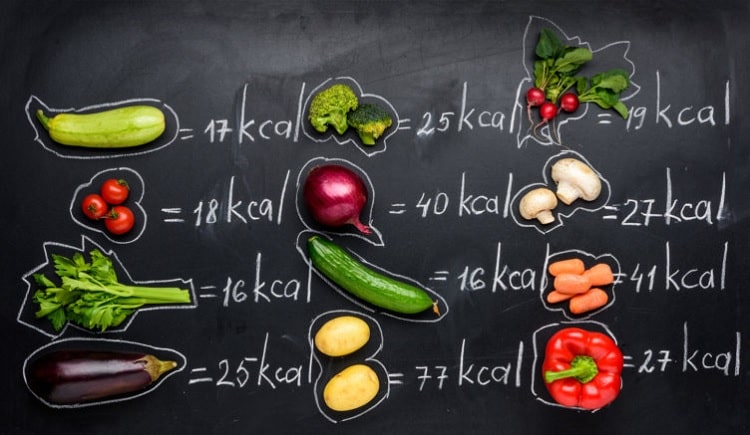The Often-Overlooked Number Of Calories Men Need To Lose Weight
Men and women should be aware of their daily caloric requirements to guarantee they fulfill their nutritional demands. Calories give our systems the thermal energy they need to operate.
Men’s typical calorie consumption differs according to age, degree of exercise, and objectives. Choose whether you wish to lose some weight, put on weight, or maintain your present weight before calculating how many calories you need to eat daily. It would be best to determine how much energy you need each day.
We will cover men’s calorie consumption for weight loss in this article. Keep reading to learn more.

Why Do Calories Matter?
The energy measurement is in calories, and each gram of the three main macronutrients has a certain amount of calories. Fat, for example, has 9 calories per gram, whereas carbohydrates and proteins have four calories per gram. As a result, calories represent the energy consumed in food and beverages, including fats, proteins, carbs, and sugars.
What Amount of Calories Does A Man Need Daily?
Generally speaking, men require more calories per day than women do. Men require more since they are bigger and more muscular than women. The following parameters are typically used to determine how many calories are needed each day:
- Weight and Height- Height is essential as men are typically larger than women. So more muscle mass you possess, the more pounds you carry, and the taller your height, the more calories you require daily.
- Exercise – The number of calories you require each day depends on how much exercise you get.
- Age – You begin to lose muscle tissue as you become older. As a result, your system consumes fewer calories to maintain itself.
- Basal Metabolic Rate (BMR) – Your system needs a certain amount of calories when resting for it to function correctly. This value does not denote the number of calories required for a workout.
Nevertheless, the Nutrition Information label provided by the U.S. FDA utilizes a 2,000 caloric intake as an example. The figure serves as a data source for daily values and percent daily value. A 2,000-calorie diet is not advised in any case.
A caloric calculator is useful when calculating the recommended daily calorie intake. To use such calculators, you must enter your birthday, height (in feet and inches), degree of exercise, and present weight. You will also be required to enter the desired weight and a deadline to attain your objective. Remember that one to two pounds each week is considered normal and appropriate if you want to lose weight.
For instance, a 43-year-old man with average height, 160 lbs, and average activity level need 2,608 kcal daily to sustain his weight. However, whether someone wants to put on weight or lose weight, his calorie requirements will alter.

Men’s Calorie Needs Versus Women’s
Gender is a factor that almost all calorie counters consider in combination with body weight and level of physical activity. This is because a male body typically needs extra calories to function.
Most of the time, men are more potent than women.
The additional muscle uses much more energy. Men are typically taller than women, which increases their calorie requirements.
Men frequently require more calories, even among people of equal size to women. Men can put more effort during workouts and need more energy to sustain due to their typically more significant pulmonary function, which is demonstrated by a higher overall Oxygen consumption.
The Overall Calorie Limit
The daily calorie intake needed to maintain or increase weight is known as the caloric limit. The amount of calories your body needs depends on your weight and the intensity of your workout. For example, if you work out daily utilizing your complete body, you’ll require extra calories than an inactive person who uses a portion of their body.
It would be best to consume fewer calories than you expend to maintain weight. Typical calorie limits are as follows:
Weight-Based Limit
The number of calories you require daily if you’re underweight and don’t have any ongoing health problems ranges from 1,200 to 1,500. In contrast, you should take fewer than 1,200 – 1,500 calories per day if you are overweight or obese.
The most that a guy may lose weight while still being fit is 1,500 calories daily. If someone is obese or overweight and following a fat loss strategy, he requires 1,200 – 1,500 calories. The calorie barrier for heavier males would be approximately 1,000 – 1,200 calories.
Exercise-Based Limit
Your requirement for calories will increase as the intensity of your workout increases. It would be best if you sought to consume around the below calorie intake daily:
Athletes who engage in more strenuous exercise should consume between 2,500 – 3,000 calories daily, and 2,000–2,500 calories for inactive people.
Age-Based Limit
Your daily calorie requirements increase when you are young. This results from your increased muscular mass, which demands significant energy. 1,200 – 1,800 calories a day are sufficient for elderly guys. The more youthful you are, the more calories you should consume daily, at minimum 2,400 – 2,800.
Calorie Intake for Men Who Want to Lose Weight
You should generate a calorie deficit if your objective is to keep the weight down. To lose weight efficiently, a man must consume fewer calories than he requires. You may reduce your calorie intake by around 500 calories daily, or 3500 on average weekly. Nevertheless, you should adjust your quantity following variations in your body’s chemistry.
For a weekly weight reduction of 1 to 1.5 pounds, several weight loss strategies for men call for 1,500 to 1,800 calories daily. However, your specific demands can change. You can more sustainably customize your intake by consulting with a licensed nutritionist.
Once more, age and amount of activity are crucial factors. You may eat more calories and lose weight if you work out frequently and vigorously or if your job requires much exertion.
Equilibrium between the macronutrients is crucial for weight loss. When cutting calories, make an effort to center meals on lean sources of protein and nutritious carbohydrates, such as whole oats, berries, and veggies.
Wholesome carbs high in protein and fiber will make you feel satiated and content so that you can follow your diet plan. To increase fullness and maintain the well-being of your body, consume healthy fats.

Men’s Maintenance Calorie Needs
Eating adequate food to meet your standard energy requirements is essential for keeping weight. You will shed fat and muscle tissue if your daily caloric intake is insufficient. However, if you eat too many calories, your body will accumulate the extra energy as adipose. You may use calculators to figure out the amount of calories you expend per day.
Here are the typical daily calories needed by a man to retain his weight. These figures are based on an averagely fit male who weighs 175 pounds and is around 5’10” tall-
- Thirty-year-old male: 2728 calories daily
- Forty-year-old male: 2651 calories daily
- Fifty-year-old male: 2573 calories daily
- Sixty-year-old male: 2496 calories daily
- Seventy-year-old male: 2418 calories daily
- Eighty-year-old male: 2341 calories daily
Men who engage in light activity should consume fewer calories each day for weight maintenance. You should eat extra calories, though, if you are particularly sporty or have a profession that requires regular physical activity.
You may have noticed that you require fewer calories as you age since your metabolic rate decreases. Your body needs fewer calories to power itself as a consequence.
Advice on How to Cut Your Calorie Intake
Increase Your Water Intake
Drinking extra water is one fitness-related action you could be doing. According to research, being hydrated aids weight control improves well-being, and leaves you satisfied. A satisfied person doesn’t crave food and entirely influences calorie consumption. Furthermore, drinking plain water has no calories.
Increase Your Protein Consumption
Eating suitable protein may control your calorie consumption, which will help you lose weight. Studies show, for example, that increasing your protein consumption can help you lose weight. It can also make you feel satisfied for longer, which prevents you from continuously munching on high-calorie meals.
In addition, the metabolism of proteins uses more energy; therefore, consuming a high-protein meal can raise daily calorie burn by 80 to 100 calories.
It Would Be Best If You Avoid Sugary Beverages
Limiting the amount of sugar-laden juices, canned orange juice, cocktails, choco milk, and other high-sugar beverages you consume is another straightforward modification you may make. Most individuals do not view empty calories as complete as calories from substantial meals. But after consuming sweetened drinks all day, liquid calories might amount to dozens of additional calories.
Cut Back On Carbohydrates
Eat fewer highly processed meals or refined carbs. Refined carbohydrates are foods like bread, wafers, and pasta stripped of germs and bran. Cutting back on carbohydrates is an excellent way to reduce your calorie consumption. Additionally, it promotes more effective weight loss.
Risks Associated with Counting Calories
When choosing what and how you’ll eat, there are numerous additional things to consider, even if tracking calories could be a helpful weight loss method. The best course of action is to adopt a healthy diet rich in a variety of nutrient-dense, wholesome foods rather than focusing simply on calories.
Avoid becoming fixated on calorie restriction if you decide to do so. Counting calories is not a viable strategy. Consistently keeping track of your diet requires patience as well as some work. You might not possess a calorie track when life gets hectic and stressful situations increase. Because of this, you could begin to feel guilty about breaking your resolution and develop compulsive tendencies.
Last but not least, counting calories is a complex process. Your body needs different amounts of calories depending on the day. As a result, obsessing about stats and weight can cause unhealthy eating habits.
Conclusion
A quick guide or formula does not determine the precise number of calories men should consume daily. Age, weight, fitness objectives, genes, and environment significantly influence your calorie status. If so, you should see a qualified nutritionist about your calorie needs, preferred foods, meal preparation, and the best macro combinations.
You may then create a meal plan that supplies you with the average number of calories you require depending on your goals and way of living.
Faqs
A man must consume 2,100 fewer calories daily to lose one pound weekly. Physically fit men who walk more than 3 miles daily require 2,800–3,000 calories daily to maintain weight and 2,300–2,500 calories per day to lose 1 pound on average weekly.
Yes, a male should limit his daily caloric intake to 1,500 calories at the very minimum unless a doctor advises otherwise. 1,500 calories allow you to receive all the nutrients you need while maintaining a calorie deficit with thoughtful preparation on a calorie counter. For a sporty or physically active man, 1500 calories are insufficient.
An everyday calorie burn for the typical individual is about 180. Additionally, sitting for an hour consumes around 75 calories. However, standing or sitting will undoubtedly result in a higher calorie burn each hour.







